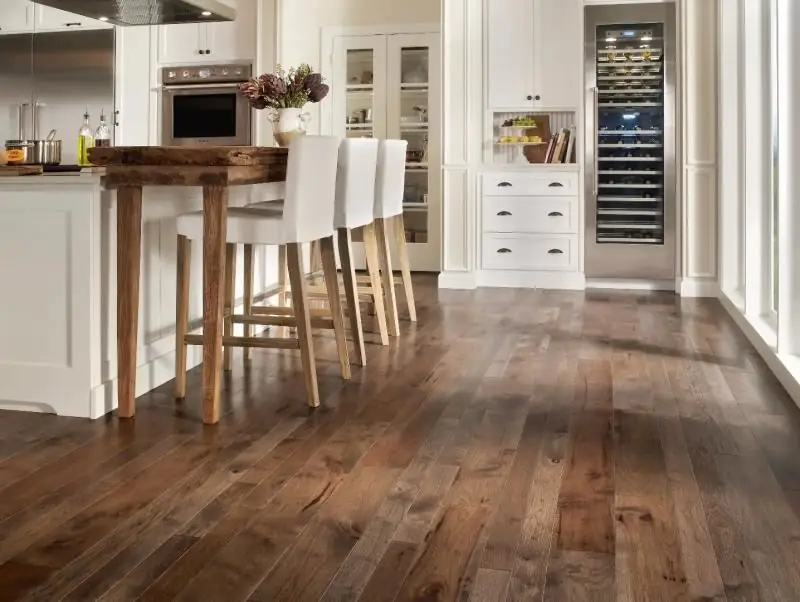
Table of contents:
- Author Bailey Albertson albertson@usefultipsdiy.com.
- Public 2024-01-17 22:26.
- Last modified 2025-06-01 07:32.
Kitchen sinks made of porcelain stoneware: what is the secret of their popularity

Kitchen sinks made of porcelain stoneware, which were rare and very expensive not so long ago, are becoming more and more affordable for a wide range of consumers. Today, in terms of popularity, they are in no way inferior to the usual stainless steel sinks.
Content
-
1 Features of porcelain stoneware kitchen sinks
1.1 Video: testing a granite sink
-
2 Recommendations for choosing a stone sink
-
2.1 Choice of size and shape
- 2.1.1 Photo Gallery: Double Bowl Granite Kitchen Sinks
- 2.1.2 Photo Gallery: Granite Kitchen Sinks with Extra Wings
- 2.2 Choice of colors
- 2.3 Mixer selection
-
2.4 Choice of accessories
2.4.1 Photo Gallery: Accessories for Granite Sinks
- 2.5 Video: how to choose a sink
-
-
3 Tips for Caring for Your Granite Sink
3.1 Video: taking care of the porcelain stoneware sink correctly
Features of porcelain stoneware kitchen sinks
Strictly speaking, there are no sinks made of porcelain stoneware. There is some confusion of concepts here. It is more correct to call the material for their manufacture a composite or artificial stone. Which, by the way, is also not entirely true, since the stone, or rather stone chips (granite, quartz, marble, etc.) are just real. The content of the mineral component can reach 80% (this value is considered optimal); artificial acrylic or polymer resins are used as a binder. The appearance and consumer qualities are ultimately determined by the percentage of these components.

Composite material for sinks is 80% composed of stone chips
There is no uniform technology for preparing a mixture for porcelain stoneware sinks; each manufacturing company has its own proprietary and patented recipe, as well as a name. For example, the well-known German company Blanco calls its material silgranite (SILGRANIT PuraDur), the Swiss concern Franke - fragranite (Fragranite DuraKleen Plus), the Japanese company Omoikiri - tetogranite (TETOGRANIT).

A simple man in the street will not be able to distinguish the material of sinks from different manufacturers, but they differ slightly in their properties.
Granite sinks have a number of positive qualities that make them especially in demand:
- a wide variety of shapes and colors;
- durability and resistance to scratches;
- high hygiene - pathogenic fungi and bacteria do not accumulate and multiply on the surface of the sink;
- durability - porcelain stoneware sinks can last up to 50 years;
- durability - the product retains its original appearance for a very long time;
- exceptional heat resistance - products are able to withstand temperature rise up to +280 ° C, as well as sharp temperature jumps;
- impact resistance;
- chemical resistance - no household chemicals are terrible for granite sinks;
- noiselessness;
- ease of care - the surface of the sink has no pores, therefore dirt and fats are not absorbed into it;
- resistance to fading;
- attractive appearance and the ability to harmoniously fit into any interior.

You can safely put a hot pan on a granite sink directly from the stove
The disadvantages of granite kitchen sinks include the following:
- high cost;
- impossibility of restoration - with a strong point impact, chips may form along the edge of the drain hole, which, however, does not affect the functionality;
- rather heavy - some models are difficult to lift and move alone.
Our kitchen unit now has a German Blanco stone sink, although it was originally a cheap stainless steel sink. Then the stainless steel had to be changed, as it looked constantly untidy and unkempt because of the stains that remain even from clean water. Granite sink is devoid of such disadvantages. You can safely pour hot and even boiling water into it. The only danger is that the plastic siphon can melt, and nothing happens to the washing material itself.
Video: testing granite sink
Recommendations for choosing a stone sink
The choice of a sink for your kitchen should be approached responsibly and seriously, because the comfort and convenience of using the entire kitchen set will depend on it.
Choice of size and shape
The dimensions of the kitchen sink are selected based on the size of the headset and the number of residents. Its length can vary from 40 to 150 cm, the width is always limited by the width of the table top.
There are several forms of kitchen sinks:
-
Round. Single-bowl sinks with a diameter of 45 to 51 cm, with a maximum internal volume. Best suited for small kitchens.

Round sink Round sinks have the largest internal bowl volume
-
Square. A traditional form of sink, also usually consisting of a single dishwashing container. The standard size is between 40-50 cm (rarely more).

Square sink A small square sink is enough if the kitchen has a dishwasher
-
Rectangular. The largest and most numerous group with an extensive range of sizes. You can choose a very small model about 30 cm long for narrow worktops and a huge sink, reaching 150 cm.

Rectangular sink The range of rectangular sinks is very wide
-
Corner. Kitchen sink specially designed to fit in the corner unit of the kitchen unit. The simplest one has a triangular shape, the more complex configuration can have up to 5-6 angles.

Corner sink Corner sink is installed in the corner of the kitchen unit
The number of working bowls for sinks can be different (up to 3-4 pieces). They can be full of the same size, or they can be different. The smaller capacity is often used for washing greens, vegetables and fruits, as well as defrosting food.
Photo Gallery: Double Bowl Granite Kitchen Sinks
-

Two-bowl corner sink - Large corner sink with almost equal bowls is suitable for a large family
-

Corner sink with round bowl - The corner sink can have a main round bowl and a small additional
-

Rounded corner sink - Corner two-bowl sink is rounded
-

Granite corner sink - Very convenient sinks with a large main bowl and an additional smaller one
-

Two-bowl white sink - In a small bowl, they usually defrost food or wash herbs, vegetables, fruits
-

Two-bowl stone black sink - In one of the large, identical bowls, you can soak dirty dishes with dried food particles
-

Shaped two-bowl sink - Sometimes there are two-bowl sinks of an unusual shape.
-

Double bowl sink with drainer - Large kitchens are equipped with sinks with an additional small bowl and a large wing.
-

Double bowl brown stone sink - Bowls can be exactly the same size
-

Rectangular double bowl sink - Bowls in the sink can be of different sizes, but the same depth
-

Red sink - Sometimes the second bowl is very small
-

Square two-bowl sink - Square sinks with two bowls are suitable for small kitchens.
-

Corner sink with three bowls - The corner sink can have three bowls of different shapes and sizes
-

Oval sink - Oval two-bowl sinks look very interesting
An important factor when choosing any sink is its depth. The most convenient and optimal capacity is considered to be about 17-20 cm deep. Under a shallow, shallow sink, you have to select a high mixer, otherwise large dishes simply will not fit under it. In this case, the falling water will be sprayed in different directions. Very deep patterns force you to bend over, which makes your back tired. In addition, children and people of short stature may simply not reach the bottom.

The optimum sink depth is 17 to 20 cm.
Many housewives choose models equipped with additional platforms-wings to the right or left of the bowl (sometimes on both sides). They can be used as a dish drainer or as an additional kitchen work surface.
Photo Gallery: Granite Kitchen Sinks with Extra Wings
-

Stone sink with wing - You can put washed dishes on the wing or use it as an additional work surface
-

Small Wing Sink - The wing is very small
-

Corner sink with drainer - A corner sink always has a wing
-

Oval sink with drainer - The oval sink with a drainer looks very harmonious
-

Rounded sink with drainer - A sink with a drainer may not have a strictly rectangular shape
-

Stone sink with drainer and small extra bowl - In operation, sinks with a small additional sink and a small wing are very convenient
-

Sink with large drainer and additional bowl - Large sink with drainer and second bowl suitable for large kitchens
-

Corner sink with two wings - Corner sink can have two bowls and two wings
-

Oval sink with unusual drain - The sink fender can look pretty unusual
-

Granite sink with drip tray - The wing can be a shallow bowl
Porcelain stoneware sinks differ in the type of installation:
-
Overhead. Installed on the lower kitchen cabinet from above, the tabletop is not needed here.

Overhead sink The overhead sink is installed on the lower kitchen cabinet instead of the table top
-
Mortise. They are mounted in the kitchen worktop, for which a corresponding hole is cut in it.

Mortise stone sink The inset sink is installed directly into the worktop and is held by its edges
-
Under-table. Placed under acrylic or quartz countertops, they rarely can be correctly installed under plastic.

Undercounter stone sinks Undercounter sinks are glued under the countertop
Choice of colors
Manufacturers offer granite sinks in a wide range of colors. Usually their color is selected based on the following considerations:
- as close as possible to the color of the countertop;
- in the color of furniture facades;
- in contrast to the table top.
But practicality must be remembered. White and very light shells get dirty quickly, any dirt is immediately noticeable on them. On dark and especially black sinks, salt deposits contained in tap water are very visible.

Manufacturers offer a wide range of colors of granite sinks
Mixer selection
It is recommended to purchase a kitchen faucet simultaneously with the sink and from the same manufacturer, so there will be more chances of hitting one tone. Unlike a sink, it is made of metal, and on top is only covered with compounds that repeat the color of the sink.

It is best to buy a mixer in the same color with a granite sink
The mixer configuration can be different, everything is determined by personal preference. When choosing, be sure to take into account the height of the spout, it must correspond to the depth of the bowl. It makes no sense to take a very high tap for a spacious and deep sink, it will be inconvenient to use them.

Faucets with a pull-out spray are very convenient
Choice of accessories
Modern kitchen sinks made of granite can be additionally equipped with various convenient and useful accessories:
- cutting boards made of wood, plastic or glass;
- colander;
- baskets;
- dryers;
- lattices;
- automatic valves;
- dispensers for liquid detergent, etc.
Photo gallery: accessories for granite sinks
-

Dispenser - Integrated dispenser removes the detergent bottle from the countertop
-

Glass board - Cutting boards can be glass
-

Wooden plank - Most often, cutting boards are made of wood.
-

Automatic valve - The automatic valve allows you to drain water from the sink without getting your hands wet
-

Colander - Colander is used instead of a colander
-

Corner Colander - You can choose a colander for a corner sink
-

Grid - The mesh container is placed on the bottom of the sink
-

Lattice - The grill is usually installed in special grooves on the sink and can be moved along them
-

Sorting - A sorting system can be installed in the sink
-

Drying - Very convenient additional drying for dishes that can be placed on the wing
Video: how to choose a sink
Granite sink care tips
Taking care of granite kitchen sinks is easy, and you just need to adhere to a few simple rules:
- Do not use concentrated chlorine-containing, abrasive cleaners, as well as various solvents, alkalis and acids.
- Regular daily care is carried out with a sponge and mild detergent.
-
To remove more serious dirt, a specialized compound must be applied to the surface of the sink, then washed off with clean water after a certain time (according to the instructions).

Detergent It is recommended to wash the granite sink with special products
- Ceramic knives should be used with caution as they are harder and can damage the composite.
- Do not expose the product to heat above +280 ° C.
- Do not throw kitchen utensils and various objects into the bowl, as this is fraught with the formation of small chips and microcracks.
- Lime deposits are cleaned with special pastes.

Caring for granite sinks is simple, but you need to do it every day
From my own experience, I can say that you need to take care of a granite sink constantly from the very first day. Although the material itself does not attract and does not absorb dirt, limescale remains. It is in it that dirt accumulates in the subsequent. Old limescale deposits are extremely difficult to remove; it is much easier to clean them up every day.
Video: we take care of the ceramic granite sink correctly
Manufacturers are constantly offering new, more convenient and interesting models of granite sinks for the kitchen, and the material used for their manufacture is also being improved. Composite sinks have proven themselves very well, so the circle of their admirers is constantly expanding.
Recommended:
Interior Sliding Partitions For Zoning The Space Of A Room: Design And Material Features, Their Pros And Cons, As Well As Installation Instructions, Photos

The device and purpose of interior sliding partitions. Varieties of partitions by design. Independent production and installation
Doorbell: Main Types And Designs, Their Pros And Cons, As Well As Installation Features

Types of doorbells, their advantages and disadvantages. How to choose the right doorbell. Features of installation, dismantling and replacement
Porcelain Stoneware Or Ceramic Tiles For The Floor In The Kitchen - Which Is Better, Comparative Characteristics, Expert Recommendations, Photo

Comparison of porcelain stoneware and ceramic tiles by the main parameters. Recommendations from experts on the choice of material for laying on the floor in the kitchen
Waterproof Laminate For The Kitchen: Composition And Properties, Pros And Cons, How To Choose The Right One, Examples With Photos

What is a waterproof laminate, its structure and properties, advantages and disadvantages. Selection recommendations. Laying waterproof laminate. Care Tips
How To Choose A Laminate For The Kitchen: Types, Pros And Cons, Recommendations, Reviews, Photos Before And After Installation

Advantages and disadvantages of laminate flooring in the kitchen, as well as the rules for choosing and maintaining flooring. Features of kitchen design with laminate
